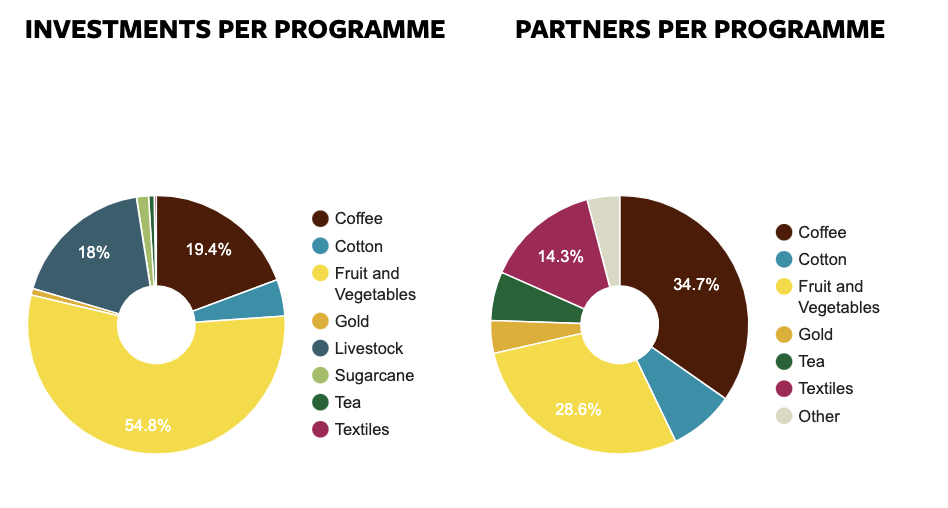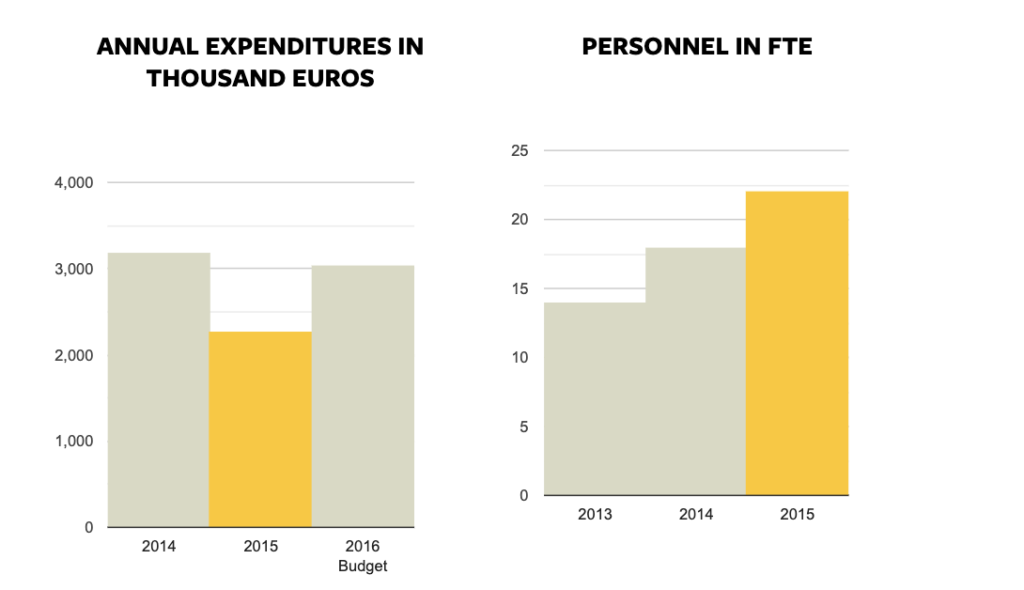REGIONAL COMMODITY PROGRAMMES
Solidaridad East & Central Africa supported smallholder farmers in making their coffee production more sustainable while strengthening producer organizations, creating an enabling environment and enhancing environmental sustainability. This was accomplished in partnership with sector leaders, coffee traders, cooperatives and unions. Solidaridad also worked with coffee smallholder farmers to improve food crop production, economic resilience and livelihoods.

From just a small organic project in Tanzania in 2011, Solidaridad has grown its cotton portfolio to include Uganda, Kenya and Ethiopia. By the close of the year, a total of 10,800 smallholders had been reached. Sustainable production principles have since been entrenched in the national cotton policies through working with leading organizations like TechnoServe, Uganda, Fibre Crops Directorate – Kenya and Ethiopian Cotton Producers, Ginners and Exporters Association and H&M.

Solidaridad East & Central Africa has worked on innovations to support farmers in improving fruit and vegetable (F&V) production by targeting greater diversity, food safety and reduced food loss. The interventions such as market linkages and certification have improved the availability of healthy products and linking farmers to premium and sustainable markets. Concerted efforts have been placed on improved access and influencing policies that affect safe food both at local and regional level.

Transformation to a safe and responsible artisanal and small-scale mining industry with the potential to reduce pollution will not be realized in isolation. Concerted efforts associated with the best possible practices for biodiversity management are required to provide access to capital, technical assistance and capacity building to improve practices that help the community access international markets for differentiated gold, and encourage a better policy environment.

The livestock sector plays an important role in the region. A pilot project in Kenya was designed to address the challenges of livestock production by working with about 6,000 pastoralists. The project has been able to improve capacity and organizational development, animal health, breeding, disease control, pasture management and market access. The herders form one business unit and supply live cows directly to the slaughterhouse with a ready market in Nairobi city.

Solidaridad worked to support sugarcane farmers and producer organizations in increasing their sustainability and economic benefits. Cheap importation of sugar has influenced local cane prices negatively, leading to low incomes among the cane farmers. The expansion of sugarcane production in Tanzania was seen as an avenue for improved incomes. With the introduction of irrigation technology, land fragmentation will soon be curbed due to a block farming approach.

Tea is an important commodity in the Eastern and Central Africa region, contributing to improved livelihoods in households and macro-economic development for the countries. Tea is also a major contributor of foreign exchange for the East Africa Community (EAC) countries, employing thousands of people from the local population and providing a source of livelihood for over 10 million citizens.

DEVELOPMENTS
The weather conditions across the region were favourable with some countries receiving enhanced rainfall as a result of the El Niño phenomenon. This contributed to the region’s economic growth, mainly in agriculture. There was significant increased international trade between the countries in the East Africa Community (EAC) trade block. There were also significant challenges associated with devolution in Kenya with introduction of the county governments. In addition, there are current and impeding general elections in Burundi, Rwanda, Tanzania and Uganda on the one hand, while on the other hand, insecurity, especially in South Sudan and Somali, continue to be of great concern. Faster integration of the East Africa Community has been slowed by these challenges. With a market size of 146 million people, there is an opportunity for rapid growth especially in our commodity chains despite these challenges.
Economic growth in Ethiopia and increasing foreign investments generate employment and economic development in various sectors in agriculture and industry (manufacturing). Constraints on private sector development still exist, but the government is creating more incentives to improve the business climate. Current development of new sector strategies creates opportunities to include sustainability issues such as boosting employment, agricultural productivity and exports as key targets of the government. Solidaridad positions itself as an enabler of this government agenda by developing concrete support programmes in various sectors through multi-stakeholder initiatives, which are aimed at contributing to the established targets and promoting sustainable growth.
Staff growth at Solidaridad East and Central Africa was also significant, which was commensurate with the projects started in the region. In Uganda, the number of staff doubled from three to eight. The inclusion of the policy influencing projects in the region will enable Solidaridad to interact with policymakers at the national, regional and local level.

ACHIEVEMENTS
Solidaridad has been able to generate a considerable amount of funding through successful fundraising in the region. Two projects were funded for Uganda by Agribusiness Initiative Trust (aBiTrust) and the Ford Foundation, targeting the fruit, vegetables and barley value chains. In total, about 14,000 smallholder farmers are being supported. In Kenya, Solidaridad won the Dutch Ministry of Foreign Affairs food security call in partnership with other local public and private sector partners. This project targets 48,500 smallholder dairy, fruit and vegetable farmers. For gold, Solidaridad saw the renewal of the sustainable gold mining project in Kenya, Uganda and Tanzania by Comic Relief. Further funding for this commodity in the FLOW programme was from the Dutch Ministry of Foreign Affairs, targeting Tanzania and Ghana. In Ethiopia, Solidaridad received around 2 million euros of external funding for multi-annual support programmes in the coffee, cotton and textiles sector in 2015.
In partnership with the Dutch embassy, Solidaridad positioned itself as a strategic partner in the cotton and textiles sector, working with brands (H&M) and local service providers (ETGAMA, ECPGEA and ETIDI). In the coffee sector, Solidaridad has been working hard to re-claim its position as a strategic partner for the private sector and the government in promoting sustainable coffee production. Solidaridad programme managers have participated in national, regional and international workshops, making key presentations about the projects in the region and providing sustainability examples during the Africa Fine Coffee Association (AFCA) meeting in Nairobi.

PARTNERSHIPS
There has been a paradigm shift by donors towards public-private partnership project implementation. Most of these partnerships led to the development of new projects in the region. In coffee, Solidaridad partnered with Nestle, cooperative unions and Jimma Coffee Institute in Ethiopia, and CBI, UTZ Certified, ATA, the Dutch embassy, the Dutch Ministry for Foreign Affairs, Progreso, ECOM, and Kofinaf in Kenya.
For cotton, Solidaridad worked closely with Pesticide Action Network, Plant Health Clinic, PEPE (DFID), Dioraphte Foundation, H&M and Dutch embassy, Fibre Crops Directorate, Rift Valley Products Limited, Better Cotton Initiative, African Cotton and Textiles Industries Federation in Ethiopia and Kenya. While our partners in Uganda included TechnoServe Uganda and Crane Bank.
For textiles, Solidaridad worked with the Dutch embassy in Ethiopia, RVO, Sympany, Ethiopian Textile and Garment Manufacturers’ Association Ethiopia (ETGAMA), Ethiopian Textile Industry Development Institute (ETIDI), H&M, GIZ and CBI.
For fruits and vegetables, Solidaridad worked with the Ford Foundation, aBiTrust and Sulma Foods in Uganda, and Hivos, SNV, ESOKO, Meru Greens and DLV in Kenya.
For livestock, we partnered with Nyongara Slaughterhouse, Ranch Meat Products Limited and Land Innovations Limited.
For tea, Solidaridad worked with Tea Directorate of the Agriculture, Fisheries and Food Authority (AFFA), Tea Research Institute (TRI), Ethical Tea Partnership, East Africa Tea Trade Association (EATTA) and a regional member’s organziation in Kenya. Solidaridad will develop partner engagement strategies, which will define the terms for engagement.
ORGANIZATION
The staff level of Solidaridad East & Central Africa continued to grow in line with the increasing number programmes and projects. A regional manager for fruits and vegetables (F&V) employed in late 2015 reported at the beginning of the year, while a horticulture advisor was engaged for the hortIMPACT project in a consortium with SNV, DLV and Hivos. In our Uganda country office, a programme coordinator was appointed to manage the two new F&V projects supported by the Ford Foundation and aBiTrust. A financial and administration assistant was employed to run the office and four field extension agronomists were employed to support field activities in 2016.
In Ethiopia, a country office was established under Ethiopian law, making Solidaridad more relevant and visible in the sector and to get the mandate to operate. This development allowed us to add three new members to the team.
Solidaridad East & Central Africa staff participated and presented papers on climate change in the Regional Tea Conference organized by EATTA, on responsible mining practices in the Business Development Services (BDS) Conference and on sustainability in tea science and development hosted by a local university. Solidaridad’s local programme manager for coffee attended a workshop organized by ISEAL in London about the baseline impact study conducted by COSA in the Mt. Elgon region of Kenya. Two staff members (food security, communications and fundraising manager, as well as the country projects manager for Uganda) attended a workshop on fundraising organized by AZN in Kampala, Uganda. The programme manager for food security presented a paper on the status of food security in coffee producing households during the 13th Africa Fine Coffee Association annual workshop and the 3rd Annual Africa Food Security Conference & Agri- Exhibition 2015 in Nairobi, Kenya.
